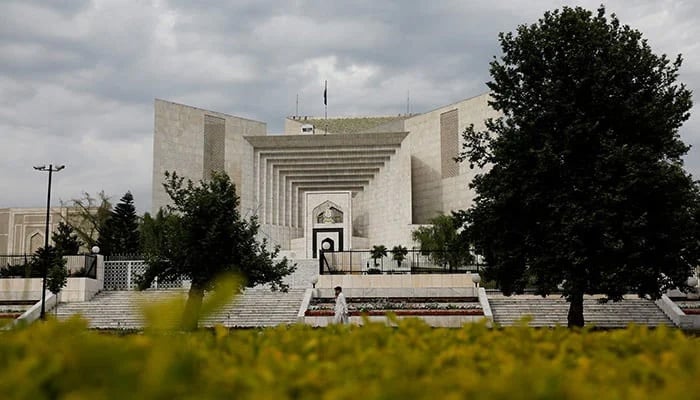Supreme Court's verdict on PTI-SIC reserved seats case 'expected today'
Apex court's 13-member full bench holds consultations on reserved seats' order under chair of CJP, say sources
ISLAMABAD: After Chief Justice of Pakistan (CJP) Qazi Faez Isa completed consultations on Wednesday, the Supreme Court is likely to announce a verdict on the Pakistan Tehreek-e-Insaf (PTI)-backed Sunni Ittehad Council's (SIC) reserved seats' case today (Thursday), sources told Geo News.
A special session of the apex court's 13-member full bench was held under the chair of CJP Isa on Wednesday, they added.
The important consultative session was summoned by the top judge to hold a discussion over the order related to the reserved seats' case.
It is noteworthy to mention here that the Supreme Court reserved the verdict on the SIC's appeals yesterday, against the Peshawar High Court's (PHC) verdict that upheld the Election Commission of Pakistan's (ECP) decision denying them the reserved seats.
The CJP-led full court reserved the verdict after conducting nine hearings on the SIC's appeals to listen to arguments from all parties, including the federal government and the poll organising body.
The bench also comprises Justice Syed Mansoor Ali Shah, Justice Muneeb Akhtar, Justice Yahya Afridi, Justice Amin-ud-Din Khan, Justice Jamal Khan Mandokhail, Justice Muhammad Ali Mazhar, Justice Athar Minallah, Justice Syed Hassan Azhar Rizvi, Justice Ayesha Malik, Justice Shahid Waheed, Justice Irfan Saadat Khan and Justice Naeem Akhtar Afghan.
What is reserved seats case?
The reserved seats' issue first emerged after over 80 PTI-backed independent candidates emerged victorious in the February 8 elections and subsequently joined the SIC in a bid to claim seats reserved for minorities and women.
However, the Imran Khan-founded party suffered a setback after the ECP, citing the party's failure to submit its list of candidates, denied allocating the reserved seats to the SIC.
The party then approached the PHC which upheld the electoral body's decision on the matter.
Subsequently, the SIC moved the apex court seeking to set aside the PHC verdict and the allocation of 67 women and 11 minority seats in the assemblies.
The allocation of reserved seats holds significance as the PTI-backed independent candidates, who make up the majority of the opposition benches, lost as many as 77 reserved seats in NA and provincial assemblies due to the PHC's verdict.
It is also to be noted that the PHC verdict allowing the allocation of reserved seats to the ruling coalition comprising the Pakistan Muslim League-Nawaz (PML-N), the Pakistan Peoples Party (PPP) and others, led to them securing a two-thirds majority in the National Assembly.
The move propelled the PML-N's number in the lower house of parliament to 123, the PPP to 73, whereas the PTI-backed SIC number stood at 82.
A three-member SC bench comprising Justice Mansoor, Justice Minallah and Justice Mazhar, took up the SIC's plea on June 6 and suspended PHC's verdict as well as the ECP's decision on the said issue.
Following the SC's decision to suspend the ECP order, the coalition lost its two-thirds majority in the lower house.
The SIC's plea, however, has been opposed by both the federal government and the electoral body.
In its submission to the court via Attorney General of Pakistan (AGP) Mansoor Usman Awan, the government has urged the apex court to reject the SIC's plea stressing that the reserved seats for minorities and women could be given to a political party which contested the polls and won at least one seat besides providing a list of candidates based on the total number of seats it won as per the law.
Meanwhile, the ECP has also adopted a somewhat similar argument contending that the party is not eligible to get reserved seats as it did not submit the list of candidates before the January 24 deadline.
-
Security forces gun down 30 terrorists in multiple IBOs in KP: ISPR
-
MQM-P calls for new province in Sindh
-
US report validates Pakistan military edge over India: PM
-
Banned TTP poses serious threat to Pakistan security: UNSC panel
-
CM Afridi clarifies remarks on by-poll after ECP requests army deployment
-
Dubai sees 3.2m Pakistani passengers in 2025 as airport sets new milestone
-
Security forces kill 23 Indian proxy terrorists in KP's Kurram
-
Pakistan to construct island to boost oil exploration: report












